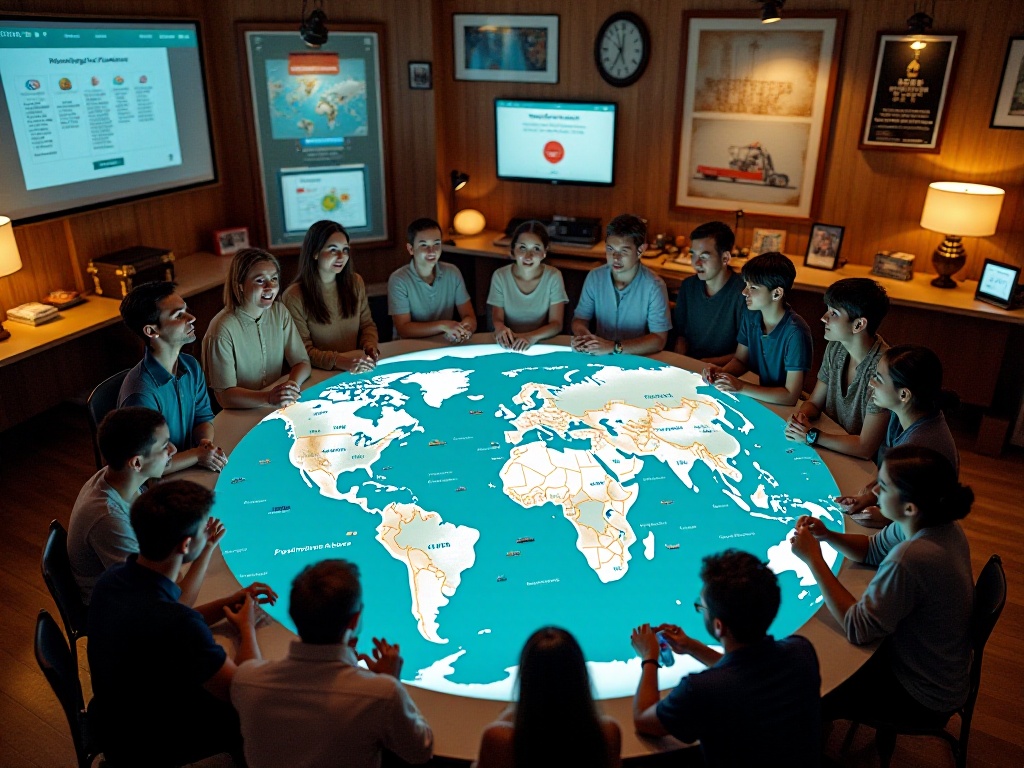Money-Saving Tips
I just returned from a two-month backpacking trip across Europe, spending only 20,000 RMB ($2,800) in total - a number that shocked all my friends. As a travel blogger who has visited many countries, I believe budgeting is crucial. While I often see travel budgets online reaching $20,000 or more, I think that's unnecessary. With careful planning, travel can be very affordable.
The key to European travel is advance planning. I started preparing six months ahead, from planning the itinerary to booking flights and applying for visas, doing thorough research at each step. Particularly for timing, I chose mid-October which offered both pleasant weather and significantly lower off-season rates.
Before departing, I listed every possible expense including transportation, accommodation, food, and attraction tickets. Through various travel forums and guides, I gained a good understanding of price levels in each city. While this preparation took considerable time, it saved me significant money.
Transportation
Honestly, I was initially shocked by European airfare prices. Tickets costing $700-800 are a nightmare for budget backpackers like me. But through years of experience, I've found there's lots of room to optimize transportation costs.
My round-trip airfare only cost $420, which many found unbelievable. The secret is simple: patience. I tracked prices through comparison apps for three months. When I got a price drop alert at 3 AM, I booked immediately. Though it was a connecting flight that took extra hours, the savings were worth it.
For travel within Europe, I mainly relied on a Eurail Pass. I bought it three months ahead on the official website during an early bird promotion for 60% off regular price. This pass allowed me unlimited train travel across most European countries for two months. Note that some high-speed trains require seat reservations - it's best to book these through the app to avoid being left without a seat.
Besides trains, I frequently used long-distance buses. For example, I took a Flixbus night bus from Paris to Amsterdam, saving both a night's accommodation and paying half the train fare. While long bus rides can be tiring, sleeping through the night made it manageable.
Within cities, I relied on walking and public transit. Many European cities offer tourist transport cards for 24, 48, or 72 hours, which are much cheaper than individual tickets. In Amsterdam, I even rented a bicycle, which was both economical and fun for exploring the city's alleys.

Accommodation Strategy
Accommodation often takes the biggest chunk of a travel budget, but with the right approach, you can keep these costs very low. During my trip, 95% of my stays were through Couchsurfing and hostels.
Many people worry about safety with Couchsurfing. However, if you do your research, carefully read host reviews, and choose hosts with many reviews, there's usually no problem. Couchsurfing not only saves on accommodation but lets you meet locals and learn about local culture. In Rome, I stayed with an Italian host who not only cooked authentic pasta but also showed me many off-the-beaten-path spots.
For hostels, I chose 8-12 bed dorms, averaging around €15 per night. While shared rooms might seem daunting, they're actually quite fun. You can meet backpackers from around the world and exchange travel tips. In Prague, I met a Korean couple who told me about volunteer programs that provide free accommodation. This approach is not only free but offers deep local experience.
When choosing hostels, I particularly look for kitchen facilities and free WiFi. Having a kitchen allows you to cook your own meals, saving significantly on food costs. Many hostels have comfortable common areas where you can watch movies or play board games with other guests in the evening.
In expensive tourist cities like Venice, I stayed in nearby towns like Padua and took the train in daily. While this meant more travel time, it cut accommodation costs by more than half. Plus, smaller cities have lower prices overall, making them a good choice.
Dining Experience
While eating in Europe isn't cheap, I managed to keep my daily food expenses to about €15. The secret is living like a local rather than a tourist.
First, make full use of hostel kitchens. I would buy groceries and cook, especially when staying in hostels. In Barcelona, my roommates and I pooled money for ingredients, spending only €5 each for a hearty dinner. Cooking and eating together was both economical and enjoyable.
When shopping at supermarkets, I paid attention to discounted items. European supermarkets often discount prepared foods and bread in the evening, sometimes up to 50% off. I would buy these for the next day's breakfast and lunch. Many supermarkets offer membership cards that provide additional savings.
For dining out, I avoided tourist areas and chose local favorites. In Paris, Turkish fast food offered great value, with €6 buying a huge shawarma. In Rome, I found a local pizzeria selling authentic Italian pizza for €5.
Many restaurants offer weekday lunch specials that are much cheaper than dinner. In Spain, I often had the Menú del día (daily menu) which included appetizer, main course, dessert, and drink for around €10 - great value.
To save money, I carried a water bottle since many European cities have free drinking fountains with excellent water quality. I also packed snacks to avoid buying overpriced food in tourist areas.

Activity Expenses
Many believe experiencing local culture requires significant spending, but that's not true. With proper planning and research, you can experience local highlights on a minimal budget.
First, learn about free admission times at attractions. The Louvre offers free entry on the first Sunday of each month, and EU citizens under 26 get in free year-round. In London, world-class museums like the British Museum and National Gallery are always free - perfect for art enthusiasts.
I often joined free walking tours, which not only save money but often feature guides telling more engaging historical stories than paid tours. In Berlin, I joined a free WWII history walking tour led by a history student whose narrative made history come alive. These tours operate on tips, allowing you to pay based on quality and your budget.
Many cities offer free concerts and art exhibitions. In Vienna, I attended a free organ concert in a church - though only 30 minutes long, it was unforgettable. The Pompidou Center in Paris offers free modern art exhibitions monthly.
Parks and street art provide excellent free entertainment. In Amsterdam, I loved sunbathing in Vondelpark, watching locals picnic and play frisbee. In Berlin, the East Side Gallery's street art provided countless photo opportunities. These experiences offer free access to city charm.

Emergency Preparation
Even with careful budgeting, unexpected expenses occur. I recommend setting aside 10% as emergency funds for various situations.
In Venice, I misread the map and missed the last water bus, forcing me to take a €40 taxi ride back. While expensive, having emergency funds meant I could handle it without stress.
In Paris, my phone suddenly broke and needed urgent repair. The emergency fund helped cover this without affecting the rest of my trip.
Additionally, I recommend purchasing reliable travel insurance before departure. While an extra expense, it can cover medical issues or lost luggage, preventing major budget impacts.

Money-Saving Tips
From this trip, I've gathered more practical saving tips. First, start planning 3-6 months ahead to catch early bird deals and research money-saving strategies.
Make full use of internet resources. Many travel apps help compare prices for flights, accommodation, and attraction tickets. I frequently use Skyscanner for flights and Booking.com and Hostelworld for accommodation.
Living like a local is crucial. Observe what locals buy at supermarkets - these items are usually more economical. Notice which restaurants locals frequent, as these often offer better value.
Take advantage of student discounts. If you're a student, always bring your ID. Many attractions offer student tickets at half price. Even non-students under 26 often qualify for youth discounts.
Consider value for money. Sometimes spending more initially can save more overall. City passes, while requiring upfront investment, can save money if you plan to visit multiple attractions.

Reflections and Insights
This budget European trip taught me that budget travel isn't just about saving money - it's a way to experience local life more deeply. When you need to be frugal, you often discover interesting places and experiences.
Friends made in hostels, joyful communal cooking sessions, interesting stories from free walking tours - these are priceless experiences money can't buy. This travel style not only saved money but created more memorable experiences.
The essence of travel isn't about visiting attractions or taking photos, but about what you experience along the way. Sometimes just walking around or sitting in a café for an afternoon better reveals a city's charm.
This trip showed me that budget travel isn't a compromise but a more meaningful way to travel. Limited budgets force you to discover interesting places and experience more authentic life.
Through careful budgeting, we can not only travel further but gather more memorable experiences. Travel's value isn't measured by money spent but by what you gain. I hope my sharing helps others with limited budgets realize their travel dreams.
Life is a journey, and the future holds promise. Each trip is a growth opportunity - let's explore this amazing world with wisdom and courage. Next time, I'll share more practical travel tips. See you then.




